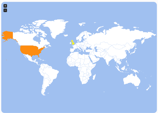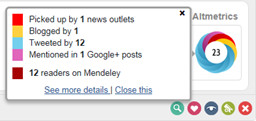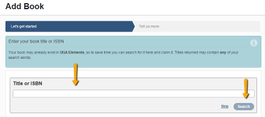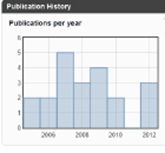Glossary of terms
Julie Noelke (Unlicensed)
Stephanie Lynn
Term | Definition |
Administrative Liaisons (ALs) | Colleges, schools, and administrative units with faculty have been assigned an Administrative Liaison for UGA Elements. |
Affiliations Map | Map coloring countries by number of affiliations
|
Web application that helps you see all of the attention surrounding your papers
| |
Repository of Electronic preprints, known as e-prints, of scientific papers in the fields of mathematics, physics, astronomy, computer science, quantitative biology, statistics and quantitative finance | |
Reference management software for formatting lists of references. BibTeX makes it easy to cite sources in a consistent manner, by separating bibliographic information from the presentation of this information. You can upload your BibTeX library into UGA Elements. | |
Database service which can be searched with academic information of articles, books and journals | |
Database from the National Institute of Informatics consisting of journal articles and citations to articles from scholarly journals, magazines, and university bulletins published in Japan | |
Citations | Number of articles or publications that refer to a recipient article. The citations data visible in UGA Elements is also used in the reporting elements of the system, and is sourced from Web of Science and Scopus
|
Co-authorship at UGA Diagram | A list of co-authors within UGA 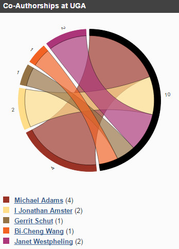 |
Elements | Refers to the individual units of functionality (modules) within the UGA Element system. (Ex. My Teaching Activities, My Professional Activities, My Publications and My Grants) |
Citation-linking network that covers over 74 million journal articles and other content items (books chapters, data, theses, technical reports) from thousands of scholarly and professional publishers around the globe | |
Computer Science Bibliography database | |
Delegate | A user (normally an assistant) nominated by another user (often a senior academic) who has the right to impersonate this other user. Using their own login, they can gain access to the system as if they are logged in as the impersonated user. Delegates also receive copies of the email correspondence the system sends to the user(s) they can impersonate. Some UGA Schools/Colleges/Units will not allow delegate assignments. Please check with your Administrative Liaison. |
Reference management software tool made by Thomson Reuters | |
Information resource for biomedical and health researchers that provides over 30 million + abstracts and 3 million + full text research articles from PubMed and PubMed Central | |
Google Books is a search index. When it finds a book with content that contains a match for search terms, it will link it to the user's search results. UGA Elements has a built in tool for adding books via a Google Books system search. Add a new book and type in the title or ISBN to use this feature.
| |
| Google Scholar provides a simple way to broadly search for scholarly literature. From one place, you can search across many disciplines and sources: articles, theses, books, abstracts and court opinions, from academic publishers, professional societies, online repositories, universities and other web sites. | |
Group Administrator Role | An Administrator with rights over a certain user group. In general, Group Administrators only have permissions that enable changes to be made to the membership of their groups and can create roles such as Statisticians and Research Managers. However, Administrators for Primary Groups can also change some of the module settings for their group. |
Impersonate | Term used to describe someone who has administrative or delegate rights to impersonate another user. |
| InCites | InCites is a citation-based evaluation tool for academic and government administrators to analyze institutional productivity and benchmark output against peers in a national or international context. |
| Modern Language Association (MLA) database | Added in fall 2016, this database can be enabled in your "My Search Settings" under the menu if it is not already being searched. The MLA sustains a wide-ranging print and electronic publishing program that includes books, journals, style guides, and an international bibliography. The MLA International Bibliography provides a subject index for books and articles published on modern languages, literature, folklore, and linguistics. |
A module to store the details of research grants, enabling relationships to be created between grants and users, publications or other elements in the system. Once created, new grant elements are available for relationships with other elements to be created by users. | |
This module collects information about professional activities and measures of esteem, such as awards, membership of professional bodies and external committees. | |
Your user profile is available to all users in the system. It contains your photo, email address, your links at UGA, your co-authors and a list of your elements. Publications, Grants and Professional Activities are grouped into recent, favorite and all tabs. | |
My Search settings | A group of settings that specify the search terms used by the Synchronizer to search the online databases for publications by a particular user. Each user has access to edit their own search settings. In addition, Group Administrators, Research Managers, and Delegates can impersonate user/users to help modify search terms. Go here to learn how to calibrate your search settings: Calibrate synchronizer settings |
Multi-Search is the University of Georgia Libraries' implementation of the EBSCO Discovery Service. Some of the most popular databases that are currently part of Multi-Search include:
| |
ProQuest includes world’s largest collection of dissertations and theses | |
Project Team for UGA Elements | UGA Elements implementation team team |
Publication History Chart |
Displays a breakdown of your deposited publications per year. This chart is updated for all faculty by a system job, so there may be a delay in the updates to this chart after you add a publication. |
The Elements “Synchronizer” searches a number of online publication databases using search criteria that include your name and your connection to UGA and other institutions. | |
Comprises more than 24 million (full-text) citations for biomedical literature from MEDLINE, life science journals, and online books. | |
| Roles (User) | General term applied to different sets of permissions and abilities within UGA Elements. Roles include System Administrator, Group Administrator, Research Manager, and Statistician. |
| SciFinder® | Research discovery application that provides unlimited access to the world's most comprehensive and authoritative source of references, substances and reactions in chemistry and related sciences |
Network devoted to the rapid worldwide dissemination of social science research and is composed of a number of specialized research networks in each of the social sciences | |
| Statistician | Reporting role that gives a user permission to access data about the members of a group |
| World's largest network of library content and services that lets you search the collections of libraries in your community and thousands more around the world | |
Web of Science is an online subscription-based scientific citation indexing service originally produced by the Institute for Scientific Information (ISI), now maintained by Clarivate Analytics (previously the Intellectual Property and Science business of Thomson Reuters), that provides a comprehensive citation search. It gives access to multiple databases that reference cross-disciplinary research, which allows for in-depth exploration of specialized sub-fields within an academic or scientific discipline. |
| Support and Help |
|---|
| Website Information |
UGA Elements Log-in UGA Elements Site |
| Systems Status Information |
UGA Systems Status Page USG Systems Status Page |


